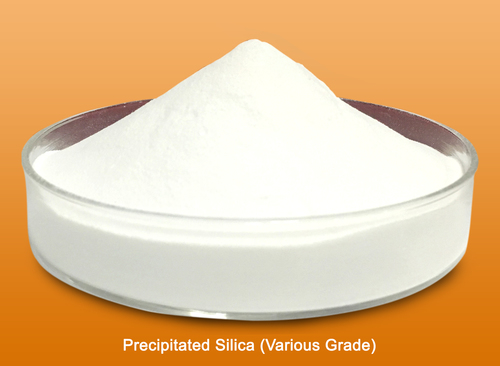Welcome to Our Website

Precipitated Silica
45.00 INR/Kilograms
Product Details:
- Grade Industrial
- Storage Room Temperature
- Shelf Life 1 Years
- Purity High
- Physical Form Powder
- Click to view more
X
Precipitated Silica Price And Quantity
- 45.00 INR/Kilograms
- 20 Kilograms
Precipitated Silica Product Specifications
- 1 Years
- High
- Powder
- Industrial
- Room Temperature
Precipitated Silica Trade Information
- Mundra
- 8 Kilograms Per Month
- 1-2 Week
- Yes
- Free samples are available
- Bags Packing
- South America Eastern Europe Africa Asia
- All India
- WHOGMP
Product Description
Having a quality centric approach, we are able to provide best grade Precipitated Silica. Offered silica is formulated using quality-assured chemical compounds at our modern processing unit. This silica is widely used in tire, rubber, footwear, food processing, paint, agricultural and other various industries. Appreciated for its longer shelf life, offered silica is tested on several quality parameters by our experts. Available in various safe packaging options, provided chemical compound can be purchased at economical prices.
Precipitated Silica Features:
- Optimum composition
- Free from impurity
- Hygienically packed
- Safe to use
Precipitated Silica Properties:
- CAS No.: 7631-86-9
- Molecular Formula: SiO2
- Molecular Weight: 60.1
- Physical state: White Free Flowing Powder.
- Boiling Point: 2000 degree centigrade
- Solubility: Practically insoluble in water
- PH: 6.0 to 7.0
Precipitated Silica Applications:
Precipitated silica, also known as synthetic amorphous silica, is a type of silica that is produced by precipitation from a solution of sodium silicate (water glass). It has a wide range of applications across various industries, some of which include:
1. Rubber Industry: Precipitated silica is widely used as a reinforcing filler in rubber products. It improves the physical and mechanical properties of rubber products such as abrasion resistance, tear strength, and tensile strength.
2. Food Industry: Precipitated silica is used as an anti-caking agent and flow aid in food products such as powdered foods, spices, and seasoning blends. It helps to prevent clumping and improves the flowability of powders.
3. Personal Care Industry: Precipitated silica is used as an abrasive in toothpaste and other oral care products. It is also used as a thickening agent, emulsifier, and stabilizer in cosmetics and personal care products.
4. Coatings Industry: Precipitated silica is used as a matting agent in coatings and paints. It helps to reduce the gloss and improve the scratch resistance of coatings.
5. Adhesives Industry: Precipitated silica is used as a thickening agent and reinforcing filler in adhesives. It helps to improve the bond strength and reduce the shrinkage of adhesives.
6. Pharmaceuticals Industry: Precipitated silica is used as a pharmaceutical excipient in tablet formulations. It helps to improve the flowability and compressibility of powders.
These are just some of the many applications of precipitated silica. Its unique properties make it a versatile material that can be used in a wide range of industries.
Frequently Asked Questions:
1. What is precipitated silica?
Ans: Precipitated silica is a synthetic form of amorphous silica that is produced by precipitation from a solution of sodium silicate (water glass). It is a white, odorless, and tasteless powder with a high surface area and porosity.
2. What are the properties of precipitated silica?
Ans: Precipitated silica has several unique properties, including high surface area, porosity, and absorbency. It is also a good reinforcing filler and can improve the physical and mechanical properties of rubber products.
3. What are the applications of precipitated silica?
Ans: Precipitated silica is used in a wide range of industries, including rubber, food, personal care, coatings, adhesives, and pharmaceuticals. It is used as a reinforcing filler, anti-caking agent, flow aid, matting agent, thickening agent, emulsifier, stabilizer, and pharmaceutical excipient.
4. How is precipitated silica produced?
Ans: Precipitated silica is produced by reacting sodium silicate with an acid, typically sulfuric acid, under controlled conditions. The resulting silica particles are then washed, filtered, and dried to obtain a white, free-flowing powder.
5. Is precipitated silica safe?
Ans: Yes, precipitated silica is generally considered safe for use in food, personal care, and pharmaceutical applications. However, like any material, it should be handled with care and used in accordance with recommended practices and guidelines.
6. What are the advantages of using precipitated silica?
Ans: The advantages of using precipitated silica include improved physical and mechanical properties of rubber products, reduced clumping and improved flowability of powders in food and personal care products, reduced gloss and improved scratch resistance in coatings, improved bond strength and reduced shrinkage in adhesives, and improved compressibility and flowability of powders in pharmaceutical formulations.
Enter Buying Requirement Details
 English
English Spanish
Spanish French
French German
German Italian
Italian Chinese (Simplified)
Chinese (Simplified) Japanese
Japanese Korean
Korean Arabic
Arabic Portuguese
Portuguese

 Call Me Free
Call Me Free